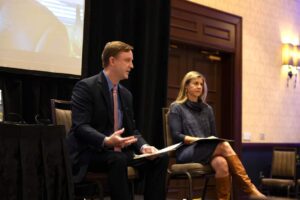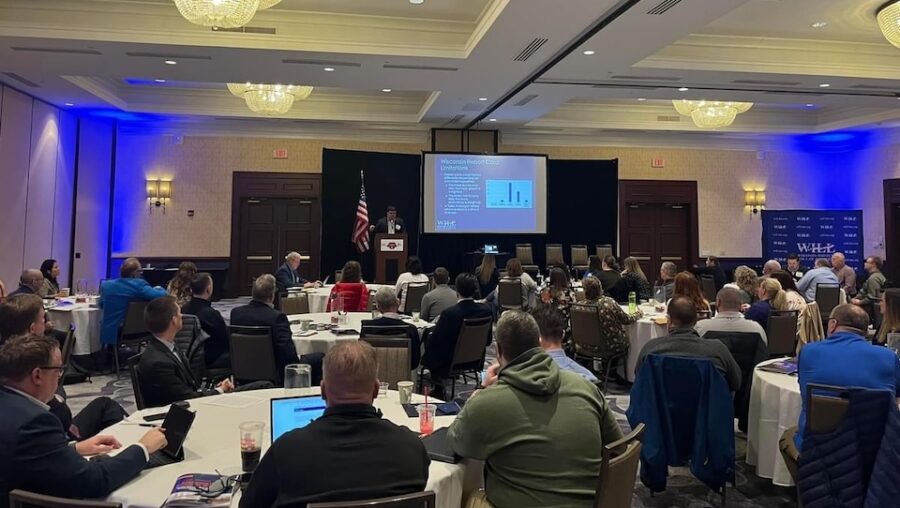On April 12, the right-wing Wisconsin Institute for Law and Liberty (WILL) hosted a School Board Summit outside of Milwaukee for the state’s school board members and candidates. The Noah Webster Educational Foundation (NWEF), a Christian education nonprofit based in Virginia that has held at least one similar summit there, co-hosted the event, which reportedly attracted “over one hundred attendees, including school board members and administrators from districts around the state.”
In addition to “training” attendees, the conference took on culture war issues central to the far right. A panel titled “Ensuring Racial Nondiscrimination for Wisconsin Students and Educators” appeared to be aimed at demonizing diversity, equity, and inclusion (DEI) policies and teaching the facts about the history of racism in the U.S. The agenda lists WILL President Rick Esenberg, General Counsel for Southeastern Legal Foundation Kimberly Hermann, and WILL attorney Daniel Lennington as speakers on that panel.

Another panel with the neutral-sounding title “Understanding the Vital Role of Parent Involvement in Decision-making for Minor Students” attempted to steer attendees towards more radical school policies that are less accepting of LGBTQ+ students. Koch operative and Parents Defending Education President Nicole Neily and WILL Deputy Counsel Luke Berg made this presentation along with a parent and a clinical psychologist.
A third panel, “Strategies for Effective Implementation and Evaluation of Policies in the Classroom,” schooled attendees “in translating policies into effective classroom practices.” American Enterprise Institute Senior Fellow Robert Pondiscio, Thomas B. Fordham Institute Editorial and Policy Associate Daniel Buck, and WILL Attorney Cory Brewer were tapped as presenters for this one.
Registration was only open to school board members and candidates.
WILL Pushes Model Policies
WILL seems to be positioning itself as the American Legislative Exchange Council (ALEC) for school boards. Echoing messaging used by Trump and MAGA Republicans that America was better in the past, WILL launched an initiative called “Restoring American Education” in 2022 to train and serve as a resource for school board members and teachers, but with the goal of advocating model policies that enforce far-right values.
Not one of the members of WILL’s Restoring American Education Team has ever been an educator or school board member, or has a degree in education policy, according to information provided on their LinkedIn profiles. Instead, the project is led by two lawyers, Cory Brewer and Lauren Greuel, and longtime Research Director Will Flanders, who has a PhD in political science.
Notably, Greuel graduated from Hillsdale College, a Christian Right institution that is “setting up charter schools in over a dozen states and publicizing its 1776 Curriculum, which emphasizes American exceptionalism,” according to NBC News.
In 2022, WILL began publishing school board model policies on its website, followed by policy booklets in 2023 and 2024. In its quest to acquire legitimacy among school board members, WILL develops models that mix seemingly neutral recommendations such as mandating recess and prohibiting cell phones in the classroom with right-wing policies.
The “Student Gender Identity and Parental Notification and Consent” model policy, for example, targets the rights of transgender students to use their preferred names and pronouns in school by prohibiting staff members from addressing “minor students by a different name or pronouns that differ from their biological sex, during school hours, without written authorization from a parent.” Another model, the “Employee Use of Student Pronouns,” protects school employees who refuse to address students by their preferred pronouns from being disciplined. “Any professional staff member that has an objection to using names and pronouns which correspond with a gender identity inconsistent with the biological sex of a student will not be forced to do so,” the WILL policy states.
Both of these policies appear to contradict Title IX federal law, which as of August 1 will more explicitly protect the rights of transgender students to use the pronouns they prefer for their gender identity. Perhaps WILL’s policy developers know this already, which is why they’ve added this caveat at the bottom of each of these policies in bold: “This should not be construed as legal advice.”
Another model would only allow “Controversial Issues” to be addressed in the classroom as long as the lesson “does not indoctrinate or persuade students to a particular point of view.” But who determines what is controversial? In its model policy, WILL defines a “controversial” issue as “anything that is the subject of intense public argument, disagreement, or disapproval.” This definition is so broad that it could be interpreted to include teaching the scientific facts behind the unfolding climate emergency, or the historical facts of slavery and systemic racism in America.
Given this broad definition, complaints from right-wing litigation outlets like WILL in districts where this passes could conceivably keep educators from teaching anything these groups disagree with under the guise of “indoctrination.”
WILL’s “Library Materials and Parental Rights” model policy provides parents with a way to ban library books in their district. Legal guardians first have to ask librarians to prevent certain books they dislike from reaching their kids’ hands. The librarian is then required to maintain a list of all the books parents have asked to be removed from circulation and hand it over to “district personnel” who will decide which books should be banned based on whether or not they are “age-appropriate.”
Funding for School Board Grooming Likely Comes From the Bradley Foundation
While the exact funding source for WILL’s latest school policy influence project is undisclosed, the Milwaukee-based Bradley Foundation stands out as the most likely financial backer.
Since WILL was founded in 2011, the Bradley Foundation alone has provided $9.4 million — or 36% — of the institute’s total funding. If the $1.4 million received through its donor advised fund, the Bradley Impact Fund, is included, the percentage of funding jumps to 40.
Bradley calls WILL the “MVP” of its Wisconsin network, making it the logical partner for the right-wing funder to turn to for influencing school boards in Wisconsin in 2024.
Bradley has a long history of funding school board training operations. In an internal August 2014 grant proposal, it touted American Majority’s track record of training candidates that win elections:
American Majority has trained 3,853 pro-freedom individuals at more than 100 training events. 208 trained candidates have run for state or local office, 181 advanced out of their primaries to the general election. 104 went on to win their elections. These include state legislators, 45 county board supervisors, 27 municipal office holders, 22 school board members and 5 judges.
“In the spring 2014 election, American Majority-trained New Leaders flipped the Menomonee Falls Village Board and the Kenosha School Board,” Bradley staff wrote.
A year later, in a grant proposal record for the Lucy Burns Institute (LBI) (publisher of Ballotpedia), Bradley recommended $15,000 for the Wisconsin School Board Elections Project in order “to expand coverage of Wisconsin school districts to be accessible to citizens for the 2015 spring elections.” Bradley staff wrote that:
A good case study has been the Kenosha school board races from December 2013 to June 2014. Tabulating the voting histories of the board members revealed how often the board voted unanimously, and on what issues they disagreed. lt also revealed the alliances on the board, and made it clear to voters how and why certain new candidates could influence board decisions. By looking at who comprised the governing majority and how they voted, the context of the election was laid before the citizens of Kenosha.
Bradley recommended and distributed a $20,000 grant to LBI the following year, according to a grant proposal record reviewed by the Center for Media and Democracy (CMD), and Ballotpedia continues to track school board elections with backing from Bradley — to the tune of $200,000 in 2022.
Bradley hasn’t limited its school board influence funding to Wisconsin. In 2015, it gave $75,000 to the Colorado-based Jefferson County Students First for efforts that “resulted in the election of a majority of reform-oriented individuals to the school board of the district in 2013,” Bradley staff stated in the group’s grant record. Colorado’s State Policy Network (SPN) affiliate, the Independence Institute (II), also received $50,000 in 2015 for its Education Labor Project. “At the beginning of 2015, ll’s Education Labor Project’s several years of hard work could be credited with assisting the parents of Jefferson County, Loveland-based Thompson School District, and Douglas County in placing conservative reform majorities on their school board,” Bradley staff wrote in an internal grant record.
Money from Bradley and its Impact Fund has also made its way into the coffers of the organizations represented by this month’s school board summit speakers: American Enterprise Institute, Parents Defending Education, Thomas Fordham Institute, and Southeastern Legal Foundation, according to CMD’s analysis of their IRS filings.



David,
Are school board positions “non-partisan” in Wisconsin? If so, elected school board members are not required to attend these sessions….correct?
Yes, they are nonpartisan. And even if they were partisan, they wouldn’t be required to attend WILL’s grooming summits.